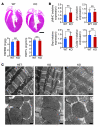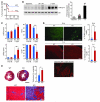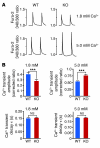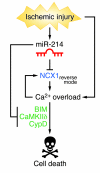MicroRNA-214 protects the mouse heart from ischemic injury by controlling Ca²⁺ overload and cell death
- PMID: 22426211
- PMCID: PMC3314458
- DOI: 10.1172/JCI59327
MicroRNA-214 protects the mouse heart from ischemic injury by controlling Ca²⁺ overload and cell death
Abstract
Early reperfusion of ischemic cardiac tissue remains the most effective intervention for improving clinical outcome following myocardial infarction. However, abnormal increases in intracellular Ca²⁺ during myocardial reperfusion can cause cardiomyocyte death and consequent loss of cardiac function, referred to as ischemia/reperfusion (IR) injury. Therapeutic modulation of Ca²⁺ handling provides some cardioprotection against the paradoxical effects of restoring blood flow to the heart, highlighting the significance of Ca²⁺ overload to IR injury. Cardiac IR is also accompanied by dynamic changes in the expression of microRNAs (miRNAs); for example, miR-214 is upregulated during ischemic injury and heart failure, but its potential role in these processes is unknown. Here, we show that genetic deletion of miR-214 in mice causes loss of cardiac contractility, increased apoptosis, and excessive fibrosis in response to IR injury. The cardioprotective roles of miR-214 during IR injury were attributed to repression of the mRNA encoding sodium/calcium exchanger 1 (Ncx1), a key regulator of Ca²⁺ influx; and to repression of several downstream effectors of Ca²⁺ signaling that mediate cell death. These findings reveal a pivotal role for miR-214 as a regulator of cardiomyocyte Ca²⁺ homeostasis and survival during cardiac injury.
Figures








References
Publication types
MeSH terms
Substances
Grants and funding
LinkOut - more resources
Full Text Sources
Other Literature Sources
Molecular Biology Databases
Miscellaneous

